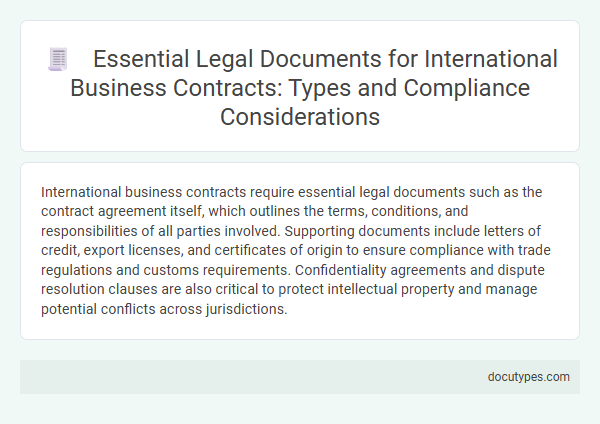International business contracts require essential legal documents such as the contract agreement itself, which outlines the terms, conditions, and responsibilities of all parties involved. Supporting documents include letters of credit, export licenses, and certificates of origin to ensure compliance with trade regulations and customs requirements. Confidentiality agreements and dispute resolution clauses are also critical to protect intellectual property and manage potential conflicts across jurisdictions.
Introduction to International Business Contracts
International business contracts are essential for defining the terms and conditions between parties from different countries. These contracts help manage legal risks and ensure clear communication in cross-border transactions.
Key legal documents required for international business contracts include the contract agreement, letters of credit, and export/import licenses. Other important documents may consist of nondisclosure agreements, arbitration clauses, and compliance certificates. Understanding these documents is crucial to avoid disputes and establish enforceable obligations between international partners.
Importance of Legal Documentation in Cross-Border Deals
Legal documentation forms the foundation of international business contracts, ensuring clarity and enforceability across jurisdictions. Proper legal documents protect all parties involved by outlining rights, responsibilities, and dispute resolution mechanisms.
- Contract Agreement - Defines the terms and conditions agreed upon between the parties in a legally binding format.
- Non-Disclosure Agreement (NDA) - Protects confidential information shared during negotiations and collaboration.
- Governing Law and Jurisdiction Clauses - Specify which country's laws apply and where any disputes will be resolved.
Your successful cross-border business transactions depend on having comprehensive legal documentation in place.
Key Types of International Business Contracts
International business contracts require specific legal documents to ensure enforceability and clarity between parties. Key documents include the contract agreement, which outlines terms and conditions, and the memorandum of understanding, which details the general intentions of the parties involved.
Other essential documents are the letter of intent, used to express preliminary commitment, and confidentiality agreements, which protect sensitive information. Purchase agreements and distribution agreements define the terms of buying, selling, and distributing goods or services internationally.
Sales Agreement Essentials
Sales agreements for international business contracts must clearly define the terms of sale, including product description, price, and delivery conditions. Essential legal documents typically include the contract itself, export licenses, and compliance certificates to meet regulatory requirements. Detailed clauses on dispute resolution, payment terms, and governing law ensure protection for all parties involved in cross-border transactions.
Licensing and Distribution Agreements
What legal documents are essential for Licensing and Distribution Agreements in international business contracts? Licensing agreements require clear documentation outlining intellectual property rights, scope of license, and payment terms. Distribution agreements must specify territory rights, duration, and responsibilities for marketing and compliance.
Confidentiality and Non-Disclosure Agreements (NDAs)
Confidentiality and Non-Disclosure Agreements (NDAs) are essential legal documents in international business contracts to protect sensitive information shared between parties. These agreements outline the obligations of each party regarding the handling and restriction of confidential data to prevent unauthorized disclosure. NDAs establish legal enforceability, ensuring trust and safeguarding proprietary information during cross-border negotiations and collaborations.
Employment and Labor Law Compliance
| Legal Document | Description | Importance in Employment and Labor Law Compliance |
|---|---|---|
| Employment Contract | Defines the terms and conditions of employment between employer and employee, including job responsibilities, remuneration, and duration. | Ensures clarity on employee rights and employer obligations, reducing risks of disputes and facilitating compliance with local labor laws. |
| Non-Disclosure Agreement (NDA) | Protects confidential business information shared with employees and contractors. | Safeguards proprietary information, aligning with labor regulations related to intellectual property and confidentiality obligations. |
| Work Permits and Visas | Authorization documents for international employees to legally work in the host country. | Compliance with immigration and labor laws preventing illegal employment and associated penalties. |
| Payroll and Tax Documents | Records detailing employee salaries, deductions, and tax contributions. | Ensures adherence to local tax regulations and social security obligations, preventing legal penalties and audits. |
| Health and Safety Policies | Documentation of workplace safety standards and employee health regulations. | Compliance with occupational health and safety laws, minimizing legal liabilities and promoting employee welfare. |
| Collective Bargaining Agreements | Contracts negotiated between employers and employee unions or representatives. | Adhering to labor rights and union agreements, essential for maintaining industrial harmony and legal compliance in certain jurisdictions. |
Governing Law and Jurisdiction Clauses
Governing law and jurisdiction clauses are essential in international business contracts to clearly define which legal system applies and where disputes will be resolved. These clauses protect your interests by providing legal certainty and helping avoid costly jurisdictional conflicts.
- Governing Law Clause - Specifies the legal framework that will govern the contract, ensuring clarity on which country's laws are applicable in interpreting the agreement.
- Jurisdiction Clause - Determines the court or arbitration venue for resolving disputes, providing predictability on where legal actions will take place.
- Importance for Enforcement - Properly drafted clauses enhance enforceability of the contract across borders and reduce risks associated with conflicting legal systems.
Risk Mitigation and Dispute Resolution Mechanisms
International business contracts demand specific legal documents to ensure effective risk mitigation and dispute resolution. Proper documentation safeguards parties by clearly outlining obligations and mechanisms for conflict handling.
- Contractual Agreement - Defines the terms, conditions, and responsibilities of each party, minimizing misunderstandings and legal risks.
- Choice of Law Clause - Specifies the governing law to prevent jurisdictional conflicts and provides clarity on applicable legal standards.
- Dispute Resolution Clause - Establishes procedures such as arbitration or mediation to resolve conflicts efficiently without prolonged litigation.
Which Legal Documents Are Required for International Business Contracts? Infographic

